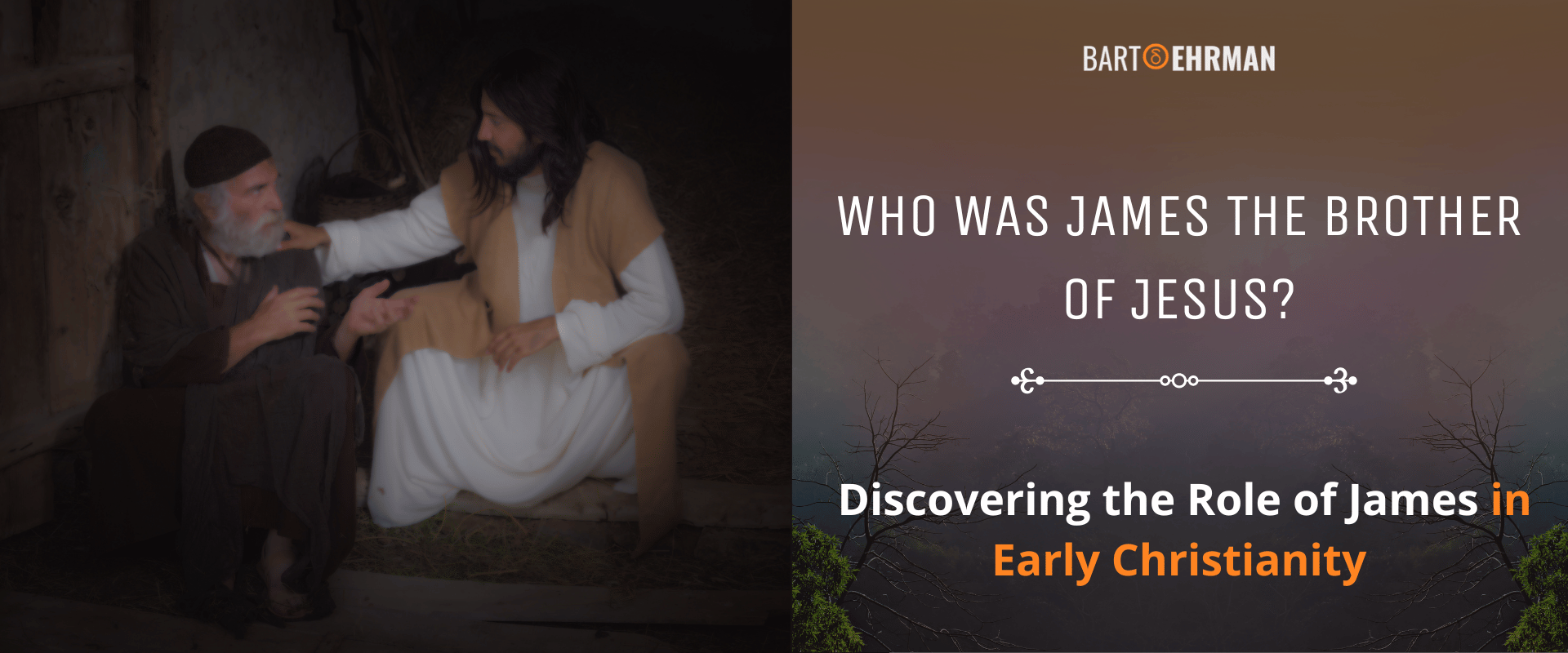Who Was James the Brother of Jesus? Discovering the Role of James in Early Christianity

Written by Marko Marina, Ph.D.
Author | Historian
Author | Historian | BE Contributor
Verified! See our guidelines
Verified! See our editorial guidelines
Date written: September 8th, 2023
Disclaimer: The views and opinions expressed in this article belong to the author and do not necessarily match my own. - Dr. Bart D. Ehrman
The history of Christianity is not solely woven through the life and teachings of Jesus of Nazareth. It's a tapestry enriched by the stories of those who stood beside Him, questioned Him, and ultimately followed in His footsteps.
Among these figures, none is as enigmatic and intriguing as James, the brother of Jesus. This article endeavors to delve into his life and the significance he had within the early Church.

James: A Close Kinship with Jesus
We must begin by asking whether the historical Jesus had siblings. I still recall an evening when I found myself engaged in a spirited debate with a close friend, a devout Catholic, about this very issue. The mere mention of the possibility that Jesus might have had brothers left him visibly perturbed.
Why? Because the Catholic dogma of the perpetual virginity of Mary asserts that Jesus’ mother remained a virgin throughout her life. As such, any suggestion that Jesus had brothers challenges this long-held dogma and can rouse strong emotions in a country where the Catholic Church has been a cornerstone of cultural and religious identity.
The New Testament speaks of Jesus’ brothers and sisters on multiple occasions, however (Mk 6: 31-35; 6:3; Jn 2:12; 7:3; Acts 1:14; 1 Cor 9:5). Mark names his brothers as James, Joses, Jude, and Simeon.
Furthermore, in Luke 2:7, Jesus is referred to as Mary's firstborn, suggesting the possibility of her having additional children. Moreover, Matthew 1:25 mentions that Joseph refrained from knowing his wife until after the birth of their son, indicating the potential for the couple to have had more children after the birth of their first son.
As a result, early church figures like Tertullian (3rd century C.E.) and Helvidius (4th century C.E.) advanced the argument that Mary did not maintain perpetual virginity. Helvidius, in particular, contended that the brothers and sisters mentioned in the Bible were the natural offspring of Mary and Joseph. A Judeo-Christian group from the 2nd century C.E. named Ebionites held the same view as well.
However, there were some alternative voices in the early Church. Two additional streams of thought are worth mentioning:
- 1The Proto Gospel of James (2nd century C.E.) suggested that James was a child of Joseph by a previous marriage. This view later became known as the “Epiphanean position”.
Was James Jesus’ half-brother? You might think this source suggests that but remember that Jesus’ real father, according to both Luke, Matthew, and the Proto Gospel of James was God! - 2A different perspective that gained prominence in the Latin West was championed by Saint Jerome (347-419 C.E.). Jerome contended that Joseph also maintained his virginity, suggesting that individuals like James and other siblings were, in truth, the offspring of Mary of Clopas. Consequently, according to this interpretation, James is Jesus’ cousin.
That leaves us with the three different theories on James’ relationship to Jesus:
- 1James was the biological brother of Jesus.
- 2James was Jesus’ “half-brother” and a son of Joseph from his previous marriage.
- 3James was a cousin of Jesus.
The latter position was eventually adopted within the official doctrine of the Catholic Church. What do we make of these theories? Was James the brother of Jesus? I opt in favor of the first theory because it passes the criteria of contextuality and the simple reading of our earliest sources.
Furthermore, the apostle Paul identifies James explicitly as “the brother of the Lord” (Gal 1: 18,19) with whom he met in Jerusalem 3 years after his conversion. Additionally, we have a non-Christian source from the 1st century C.E. conveying the same notion. A Jewish historian Josephus identifies James “as the brother of Jesus, who is called the Messiah (Ant. 20.9.1).”
In Did Jesus Exist? The Historical Argument for Jesus of Nazareth, Dr. Bart Ehrman concludes that a “plain and straightforward reading of the texts in the Gospels and in Paul leads to an unambiguous result: these “brothers” of Jesus were his actual siblings.”
James' Journey of Belief: From Skepticism to Discipleship
When did James the brother of Jesus believe in him? There are some possible indications in the Gospels that James was skeptical about Jesus and became his follower only after the resurrection. A careful reading of Mk 3:20-21, as Bart explains in an article, could be understood as saying that Jesus’ family took him away from the public eye because they thought he was beside himself.
However, in Just James: The Brother of Jesus in History and Tradition, James Painter argued that the Greek text of Mk 3:20-21 is not as decisive as some scholars think. In his opinion, the Gospels don’t provide us with enough evidence for James’ disbelief in Jesus. Also, according to the Gospel of the Hebrews (2nd century C.E.), James was present at the Last Supper.
The Gospel of the Hebrews?! Yes, that’s right! There were a lot of other Gospels that never made it into the Bible. Read about them in “The Other Gospels” by Bart Ehrman and Zlatko Plese.
Furthermore, James must have been with Jesus during his earthly ministry because that would have facilitated his eventual leadership of the early Church in Jerusalem.
In other words, he must have some connection with people such as Peter and John which would allow him to assume the role he did. Was Jesus’ brother a disciple? I’m inclined to affirmatively answer this question. Now the question is what kind of a role he took after Jesus’ death.
James the Just: A Leading Figure in the Early Church
Now and then a student asks me why James is called “the Just”. Where did that come from? As it turns out, James was a common name in the 1st century Palestine. According to a church father Hegesippus (2nd century C.E.), James was called “James the Just” because there were many James’ within the first Christian community.
And this James, as the sources indicate, held a prominent position in Jerusalem. In 1 Cor 15:7 Paul states that the resurrected Jesus appeared to James and then to other apostles.
In Acts 12:12-16 Peter, who had just escaped from prison, goes to the house of John Mark’s mother where the disciples have gathered in a prayer. There he asks them to “ tell James and the other brothers and sisters” about his escape. James could have obtained the leadership role partly because of Peter’s and John’s absence due to either prison terms or their missionary works.
In the Gospel of Thomas, James becomes the leader of the Church based on Jesus’ direct command. Furthermore, Clement of Alexandria (3rd century C.E.) observes that after Jesus’ ascension, Peter and John chose James the Just as the bishop of Jerusalem
Did You Know?
The term “bishop” comes from the Greek “ἐπίσκοπος” meaning an overseer.
James the Just and the Inclusion of Gentiles
As the head of the Jerusalem Church James obtained his most well-known role when he presided over the Apostolic council (Acts 15: 2-35). The issue that prompted this council was related to the entry of Gentiles into the Church. Should they first become Jews and uphold Mosaic Law? Do they need to get circumcised?
James had the final word in the debate. Decision? Gentiles are not obliged to circumcise!
However, we should tread carefully through the account in Acts because its author tends to show that everything within the first community worked smoothly with the help of the apostolic guidance.
Paul offers a different view of James’ role. In Galatians 2:12 James the Just is depicted as insisting that the Gentiles in the Church should be subjected to the ritual of circumcision.
In any case, the subsequent history showed that Paul won the debate on circumcision and the Mosaic Law. The Church adopted his proposition thus opening its doors to a multitude of Gentiles.
Did James of Jerusalem Actually Write the Epistle of James?
The Epistle of James opens with the author, who calls himself “James, a servant of God and of the Lord Jesus Christ. To the twelve tribes scattered among the nations (James 1:1).” By calling them “the twelve tribes in the dispersion,” the author identifies the Christians to whom he writes as the new or true Israel. Did James the brother of Jesus write it?
While some advocate for its authenticity, others contend it was written under a pseudonym. Nevertheless, based on the available knowledge, it is worth noting that the prevailing consensus among historians tends to lean toward the view that the author is not James the brother of Jesus.
The strongest piece of evidence is the fact that the letter is written in elegant Greek while displaying the knowledge of rhetorical strategies from both Jewish and pagan literature in Greek. James the brother of Jesus spoke Aramaric, not Greek, and he almost certainly couldn’t write in such an elegant manner.
Dale C. Allison's Commentary on the Epistle of James offers a thorough examination of all the available data, and his assessment carries significant weight. Ultimately, he concludes that the arguments against the traditionally ascribed authorship to St. James are more compelling and persuasive.
Nevertheless, I will refer to the author of the letter as James for convenience’s sake!

Paul vs. James: Faith vs. Works
We get a few glimpses of what church life was like when James wrote this letter. There appears to have been a somewhat advanced church community, with fairly organized leadership roles, and a wide range of members, with a tendency to give precedence to the wealthy ones.
To this group, James offers what he calls “wisdom,” full of moral exhortation and timeless advice about the moral life. For James, wisdom is not about thinking things or knowing things; it’s about doing things and acting in the right way.
Explore the contrast between Paul’s and James’ views on salvation in the table depicted below!
Paul’s Epistle to Romans 3:28 | The Epistle of James 2:14 |
|---|---|
A person is justified by faith apart from the works of the Law. | What good is it, my brothers and sisters, if someone claims to have faith but has no deeds? Can such faith save them? |
Interestingly, just as Paul in Romans used the father of the Jews, Abraham, as proof that salvation comes by faith alone (Rom 4:2), James uses him to argue that a person is saved only by doing works (Jam. 2:21).
In other words, James is trying to refute Paul’s teachings regarding faith and works. Most historians today, however, believe that he didn’t understand what Paul was saying. But that is a topic for another article!
The Death of James the Brother of Jesus
According to Josephus (Ant. 20.197-203), James was killed in the year 62 C.E. by the order of the high priest Ananus. He summoned the Sanhedrin to judge the “James the brother of Jesus who was called Christ” on the charges of having transgressed the Law.
Unfortunately, Josephus doesn’t provide us with more details. Consequently, we can’t be sure if James was brought up on charges of being a Christian or simply having transgressed the Law - even though these two are not mutually exclusive at all.
Summing up Conclusions: James the Brother of the Lord
In conclusion, our exploration of James in the Bible transcends the boundaries of family ties and theological beliefs, inviting us to ponder the multifaceted nature of tradition, history, and legend.
As we navigate these complex inquiries, one thing becomes evident: the story of James, the brother of Jesus, is both fascinating and elusive, leaving us with a profound sense of curiosity about his role in the early Christian narrative.
To further enhance our understanding of the Gospels and the early Christian world, I recommend "The Unknown Gospels" by Dr. Bart Ehrman. This resource offers eight insightful lessons, each lasting 30 minutes, that provide a scholarly perspective on the Gospels
